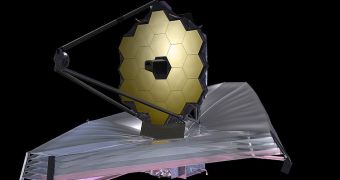Members of the American Astronomical Society (AAS) released a strong-worded statement on Thursday, July 7, dealing with the House Appropriations Committee proposal of canceling the James Webb Space Telescope (JWST), the most advanced observatory every designed.
The AAS considers the JWST to be the centerpiece of United States space astronomy for the next two decades, in the same way that the NASA Hubble Space Telescope has been serving NASA, the American government and public, and the world for more than 21 years.
The proposal to cancel the amazing telescope was put forth by members of the House Appropriations commerce, justice and science subcommittee that oversees spending for NASA, the National Oceanic and Atmospheric Administration (NOAA) and the National Science Foundation (NSF), among others.
“The proposed cancellation of JWST is a bad idea. Several billion dollars have already been spent developing new cutting-edge technology, and the last thing the American people want is for Congress to throw good money away,” Dr. Kevin B. Marvel.
“The US will rightly be proud of the accomplishments of JWST, but first we need to finish it and launch it,” adds the official, who is the executive officer at AAS.
The new proposal “would waste more taxpayer dollars than it saves while simultaneously undercutting the critical effort to utilize American engineering and ingenuity to expand human knowledge,” he says.
“Such a proposal threatens American leadership in the fields of astrophysics and advanced space technology while likely eliminating hundreds, if not thousands, of high-tech jobs,” the official statement goes on to say.
“Additionally, this proposal comes before the completion of a revised construction plan and budget for a launch of JWST by 2018. The United States position as the leader in astronomy, space science, and spaceflight is directly threatened by this proposal,” the release states.
The 6.5-meter (21.3-foot) mirror complex that is the main observations took of the JWST dwarfs the 2.4-meter (7.9-foot) main lens of the Hubble. The new telescope is meant to provide critical insight into the development of stars, galaxies, black holes, neutron stars, and a host of other space objects.
The crippling bill the subcommittee is considering for 2012 would fund NASA with $16.8 billion, about $1.9 billion less than what US President Barack Obama called far, and $1.6 billion below last year's level.
“The JWST is the highest-ranked mission in the National Academy of Science's Astronomy and Astrophysics decadal survey released in 2000 and remains a high priority for the Nation's astronomers in this decade as well,” the AAS statement adds.
“The American Astronomical Society calls upon all members of Congress to support JWST to its completion and to provide strong oversight on the path to this goal,” the document reads.
“Too many taxpayer dollars have already been spent to cancel the mission now; its benefits far outweigh the remaining costs. We are a great nation and we do great things. JWST represents our highest aspirations and will be one of our most significant accomplishments,” it concludes.

 14 DAY TRIAL //
14 DAY TRIAL //